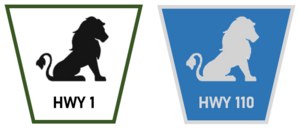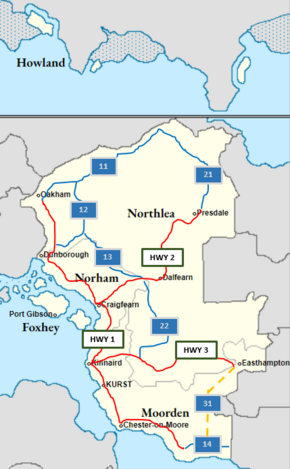Highways of Arcerion
The Arcerion National Highway System (ANHS) is a network of strategic national highways, including the Governorate Roadway System, and other roads that serve major urban centres, ports of entry such as dockyards and airports, trucking terminals and logistics hubs, military bases, and rail junctions/switchyards. Its combines length makes it one of the largest and most well-maintained road networks in Crona, and carries the most amount of logistical truck-borne commerce of any road system in the Malentine Basin. Within Arcerion, individual governorates are given federal funding from the Confederate Parliament's Ministry of Transportation to improve, maintain, and expand their interstate roads as required. The roads are all for public use, as Arcerion has no national or interstate toll highways, instead relying on existing methods of taxation to repair and maintain the network.
The National Highway System was an informal series of roads and highways but was rapidly expanded and improved in the 1970s and 1980s, culminating with the Highways Act of 1991 which established the ANHS.
The ANHS is policed by the 'P' (Patrol) Division of the Royal Arcerion Constabulary.
Legislation
The Confederate Parliament passed the Highways Act of 1991, which outlined both what highways were to be amalgamated and nationalized, as well as which of the existing plans for highways would be included in the forecasted 1992 budget for the country as it expanded infrastructure into the Arcer Heartland. It provided the architecture to develop a National Transportation Plan in conjunction with the Arco National Railway Service and maritime ports, as up to this point Arcerion had predominantly relied on heavy rail and maritime commerce, and had a relatively underdeveloped medium and long-haul trucking capacity compared to other Occidental nations. It also laid out the plans for future roadways that incorporated green energy and environmental protections, and the Ministry of Transportation worked closely with the Ministry of the Environment and Natural Resources to ensure that the placement of large roadways would not alter the local ecology of Arcerion or threaten agricultural efforts.
The Highways Act also incorporated existing disparate legislation that had originated with the creation of Highway 1, and federalized (with Governorate approvals in respective parliaments) provincial-level legislation to amalgamate and create the ANHS. The £19.2 billion Arcer Pounds that it outlined over 6 years to redevelop the system by the turn of the millenium was designed to help codify the ability to drive long-term change through structured, reliable funding, not unlike how the Armed Forces of Arcerion procured large equipment and constructed bases. Provisions for the contracting of road expansions (addition of multiple new lanes) as well as enhanced safety precautions were all baked in, and the Department of Highways was created in the federal government to ensure roadworks, contracting, and other services were provided.
Other issues that the legislation addressed included:
- Snow removal in Northlea and parts of Moorden;
- Provisions for Army funding to repair roads damaged by Armoured Vehicles;
- Mandates on the transportation of dangerous goods on Highways;
- Provisions for cooperation with the Department of Railways on joint transportation ventures (ie. Highway 33 tunnel in the Aileach Mountains);
- Regular mechanisms for reporting damages to roadways;
- Geological survey and engineering teams to prepare expansions;
- Means to track roadway collisions and incidents to create a statistical analysis of road traffic and patterns;
- Budgetary measures to empower the requirement by the Royal Arcerion Constabulary to police new roadways.
The federalization was overall welcomed in Arcerion and widely regarded by the press as a necessary measure to keep Arcerion's economy competitive. Expansion projects and roadway jobs created in the construction, concrete, and asphalt industries all would benefit and increase in the medium term, and despite traditional reluctance to allow federalization, all governorates (except Foxhey and Howland) approved the motions to federalize with majority votes over 65%.
Overview

